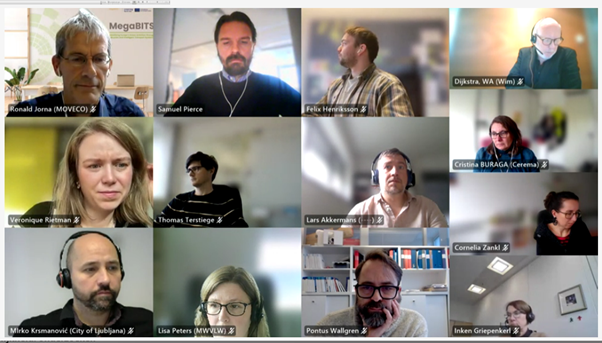On December 3, 2024, a virtual workshop brought together 30+ stakeholders in the realm of smart cycling under the initiative spearheaded by the MERIDIAN and MegaBITS projects. This task force workshop aimed to tackle the challenges and opportunities in fostering smarter and more sustainable cycling infrastructure, guided by a structured agenda and insightful discussions.

Agenda Highlights
The workshop began with participants sharing their insights into the current challenges surrounding smart cycling. This was followed by an exploration of the potential of smart cycling technologies, supported by innovative use cases.
A Miro board was used to facilitate collaboration among participants to review and refine key elements of a roadmap to scale connected cycling. They identified gaps, obstacles, and priorities for funding, ensuring that the roadmap aligned with real-world needs and opportunities.
Key topics discussed included:
- Determining who should take on leadership roles in driving smart cycling initiatives and how this could be orchestrated.
- Understanding the interplay between research, pilot projects, and readiness for large-scale implementation.
- Strategizing how to foster collaboration between industry, road authorities, and policymakers for long-term success.
Emerging Conclusions:
The conclusions of the workshop shed light on the following vital areas:
- General: There is a need for more evaluation to better understand the cost-benefit of cycling initiatives, alongside increased funding for research institutions to support this work. Sharing evaluation results widely and establishing long-term agreements between the cycling industry and road authorities are critical to ensure sustained development and collaboration.
- Data: High-quality and comprehensive cycling data is lacking across Europe, making it difficult to plan and optimize cycling infrastructure and services effectively. Increased funding, more projects, and targeted investments are required to improve data collection, establish standards and specifications, and ensure data is accessible and usable for stakeholders.
- Policy: Policy decision-makers should recognize cycling as an equal mode of transport, emphasizing its importance in urban mobility systems. This includes providing more funding, setting clear priorities for cycling use cases, and fostering cooperation between various stakeholders. Integration of smart cycling into future traffic management systems is essential for sustainable mobility.
Next Steps
As the workshop wrapped up, participants outlined immediate steps to build on the momentum:
- Refining the roadmap based on workshop insights.
- Initiating pilot projects to test feasibility and scale smart cycling solutions.
- Establishing stronger communication channels between stakeholders to ensure ongoing collaboration.
- The idea of creating a connected cycling platform was raised, which received support from many members of the group.
